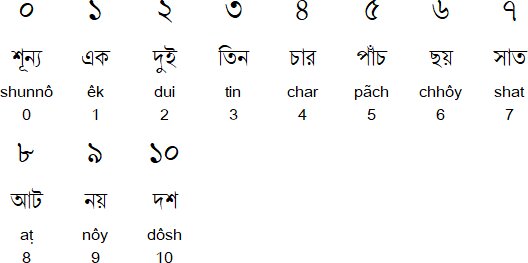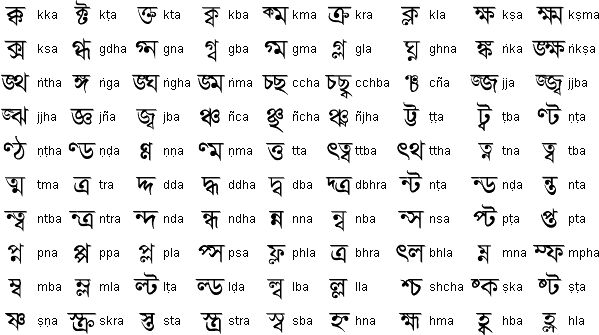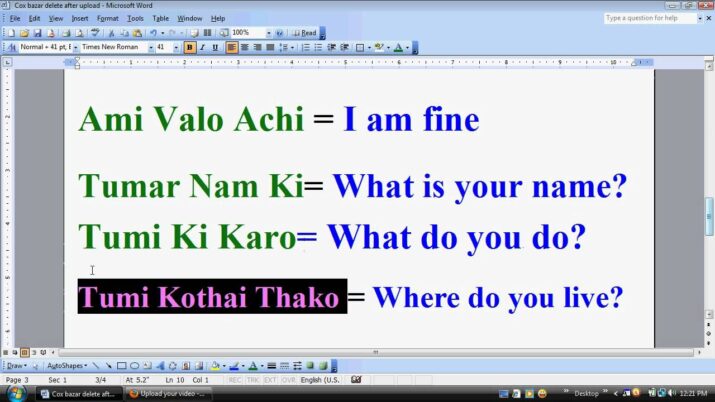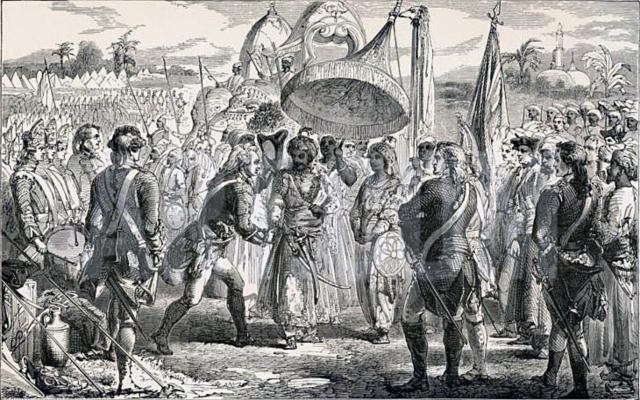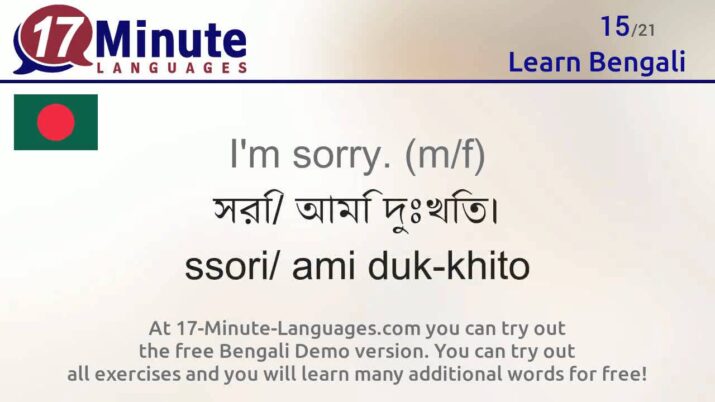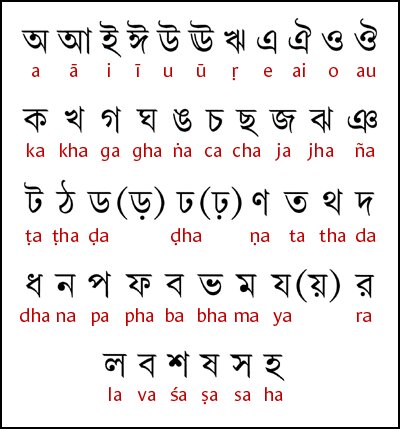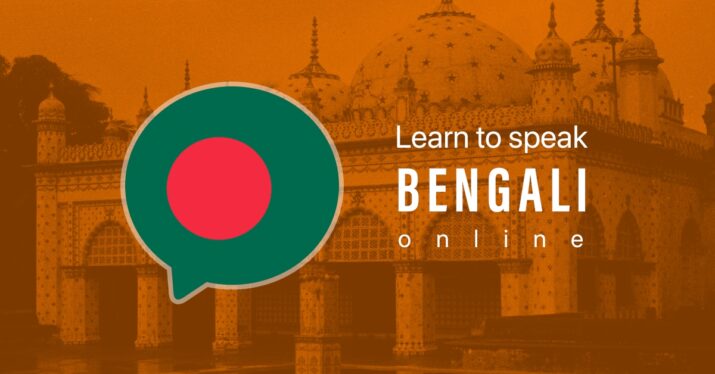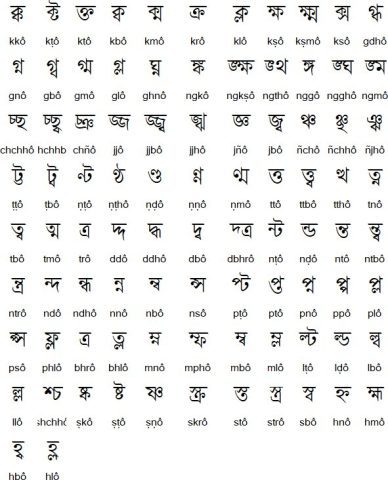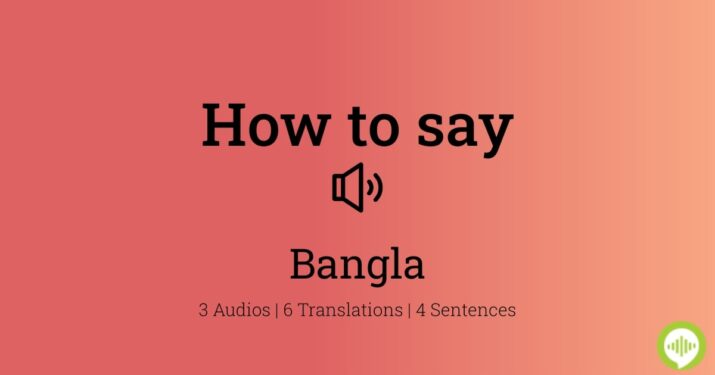Learning Bangali: All Levels Covered [2024]
By J Maver
January 10, 2024 • Fact checked by Dumb Little Man
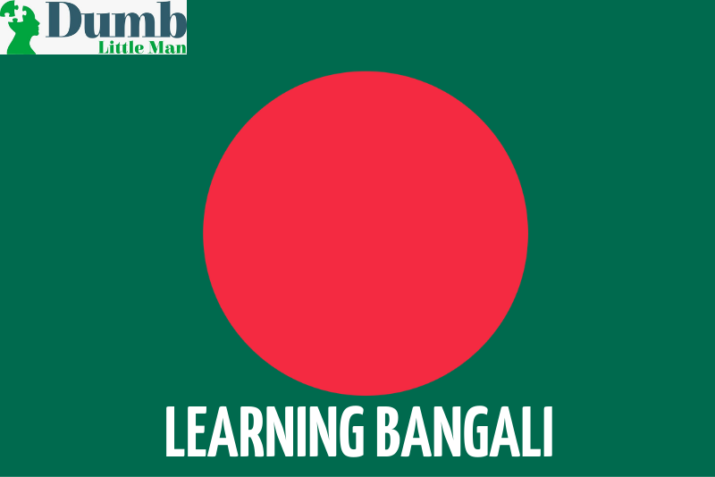
Do people speak Bangali?
As a matter of, around 288 million people around the globe speak Bangali or Bengali. The majority of them reside in the South Asian region, especially Bangladesh. As the name can already tell, around 98% of the Bangladeshi people speak Bangali.
And here's a fun fact, the Bengali language is also included in the top 10 wide spoken languages around the globe.
Image from omniglot.com
I have never heard of it, Is it popular?
Of course, it is. Bengali is the official language of Bangladesh, as well as many western states of India. But most of the world population is still not very well informed about it.
The Indian States like Tripura, Assam, and West Bengal lie nearest to the country of Bangladesh. As a result, the version of Bengali is a bit different than spoken in Bangladesh but still, it is Bengali indeed that acts as the native language of the people in these states.
Also, the features and sentences included in these various Bengali dialects are still quite easy to understand for a person speaking any Bengali dialect.
Language Class of Bengali
Time to compare the Bengali language with other popular languages around the globe. According to official reports launched by the Department of State's Foreign Service Institute, US, Bengali falls under the category of a ‘Class III Language'.
In general, the languages included in the Class III Language category are quite significantly different from English. Both culturally and grammatically.
So as an English language speaker, you will need some serious effort to get as much knowledge as possible regarding the Bengali sentences, words, and style of conversations before getting labeled as a proficient Bengali speaker.
Image from pinterest.com
Is it hard to learn?
If you're an English language speaker, then you need extra effort to learn Bengali. This is because Bengali is a Class III language when compared to English.
But as a Class II or a Class III language speaker, things will be quite easy for you to understand. The whole language learning journey for the language Bengali will require you to focus on grammar as well as common words and phrases used by native Bengali speakers.
This will help you learn Bengali and then speak Bengali fluently.
Image from youtube.com
Best resources to learn Bengali!
Determined to learn the Bangla/Bengali language? Great! Time to take your first step towards learning Bengali.
Now, you can either go with a one on one language learning session with a tutor, or you can prefer the privileges of 2024 through an online language learning app or course.
Resources like Mondly, Pimsleur, Babbel, and Italki are enriched with the Bengali vocabulary and word focusing courses. These programs specifically teach the Bengali dialect of the Bengal region, the one which is more closer to Hindi as compared to any other language.
CLICK HERE TO READ MORE ABOUT MONDLY
CLICK HERE TO READ MORE ABOUT PIMSLEUR
CLICK HERE TO READ MORE ABOUT BABBEL
CLICK HERE TO READ MORE ABOUT ITALKI
With this level of support and help, you will be proficient in Bengali in no time.
Image from youtube.com
Learning Bengali
My Journey to become proficient in Bangali
I was in the state of West Bengal, the Indian state having Bengali as its official language. But back when I was 7 years old, and still learning Bengali gradually as a child, my family decided to settle down in the US and live ‘the American dream.
So we immigrated from India to the US. From the eyes of a 7-year-old, the world is nothing more than a fun place where dreams come true by simply asking your parents.
As a result of this sudden cultural shift, English became my native language at a time when I was adapting myself to the written Bengali writing and pronunciation.
Some common challenges I faced while learning Bengali
So, as a 7-year-old, my connection with Bengali abruptly ended back in the US. All the exposure I was getting regarding Bengali was from my parent's conversations with one of some friends from the Bangla community in the US.
A couple of months back, I realized the level of my unawareness of the Hindi and Bengali culture and history I was born in. And this is when I decide to learn Bengali on my own.
But as an English speaker, the fact that Bengali was a Class II Language was really hard to overcome when I began to practice and write the Bengali letters and phrases.
Bangali: The History
The history of Bengali dates back to the history of the Bengal region itself. This language is included in the Indo-European language family primarily spoken in Bangladesh. In India, the western states are known for the wide Bengali-speaking population.
As a language, Bengali appeared in the Bangla region around 900-1000 AD along with the Assamese and Oriya languages.
Gradually, the number of Bengali speakers in the region began to increase and Bengali became the native language for the Bangla people.
Image from whatshot.in
Regional distribution of the Bangali language
The whole Bangla region can be distributed in two distinct regions. First, Bangladesh itself. Situated at the western end of the Subcontinent, Bangladesh has its 98% population recognized as Bengali speakers.
There aren't many spoken languages in this region besides Hindi and Urdu.
The second comprises certain Western states of India that fall under the Bangla region. States like West Bengal, Tripura, and Assam.
According to my very own review, the Bangla dialects of these two regions slightly differ from one another but are mostly the same in terms of vocabulary, dynamics of conversations, etc.
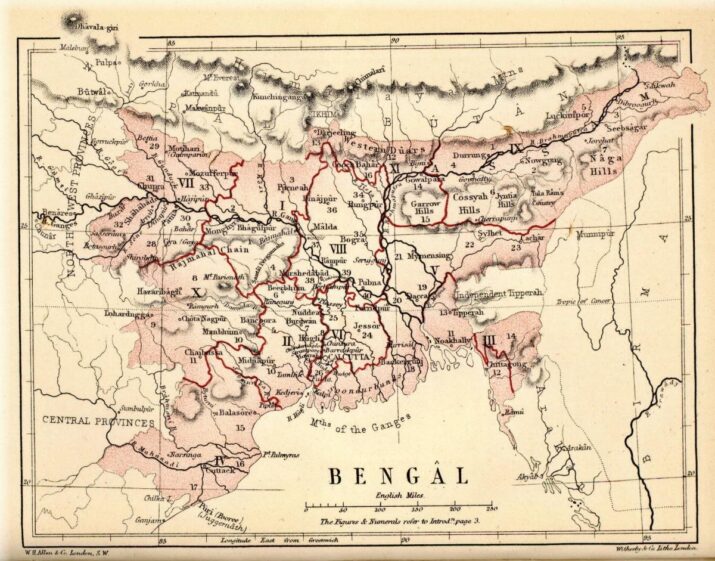
Image from en.wikipedia.com
My preferred resource to learn Bangali online
The whole procedure of Language learning can become quite difficult with an effective language learning app or course. I learned this the hard way but if you're reading this article, you don't need to do that.
Let us say you want to speak Bengali effectively, the first thing you need to do is to go through all the popular language apps/courses and their reviews.
I did the same, and in my opinion, Italki, Pimsleur, Babbel, and Mondly are some of the best options you have got based on their vocabulary and phrases resources.
CLICK HERE TO READ MORE ABOUT MONDLY
CLICK HERE TO READ MORE ABOUT PIMSLEUR
CLICK HERE TO READ MORE ABOUT BABBEL
CLICK HERE TO READ MORE ABOUT ITALKI
The best way to learn Bangali is free!
Looking for a way that will help you learn multiple languages, including Bengali, totally free? You might be surprised but there is indeed a way to learn the Bangla language other than money charging app or course.
YouTube tutorials and free podcasts. In my opinion, the quality of lessons and amount of learning you can extract from a YouTube tutorial is on a whole another language. Especially if we compare it with a language learning app or course.
With the diversity of topics, the flashcards, the audio, and the visual aid, this is your best chance to master written and spoken Bengali.
Image from youtube.com
What about the Bangali script?
If you search ‘Bengali Script' today on Google, you can start seeing the obvious difference between Bengali and Hindi writing. Although, as a Hindi speaker, you can easily read out certain Bengali letters and phrases.
This is because the Bangla region was and still is a part of the South Asian region. As a result, the Bengali words and phrases are heavily influenced by the Hindi / Sanskrit style of writing letters.
Among 228 million people residing primarily in the Bangla region, the majority can read and write Hindi as well. This shows the number of similarities between Hindi and Bengali scripts.
Image from pinterest.com
Bangali verb structure
Besides vocabulary, one needs to understand the verbal structure of Bengali as well as the spoken instructions of the language. Of all the lessons I have gone through, the Bengali verbal structure is quite different than other world languages. Especially English.
In written form, the Bengali verb placement is quite different than English. In Bengali written scripts, a phrase/sentence will have the verb placed at the end of the sentence or near it.
So in English, the sentence will be translated as' We today breakfast ate not'. Quite confusing for an English speaker trying to learn Bengali for the first time.
Image from mondly.com
Is Bangali a genderless language?
In simple words, yes. Bengali is indeed a genderless language. I also came to know about this fact when I was trying to learn Bengali just to speak Bengali like the Bangla speakers.
No matter what Bengali course you are taking, you can experience the genderless nature of Bengali when focusing on day to day basis spoken Bengali words and phrases.
In daily conversations, the Bangla speakers love to speak on any topic with a pronoun structure that's suitable to be used for both men and women equally. You can only tell the difference when trying to speak Bengali, which makes it one of the most fun languages to learn and speak as well.
Some common Bengali pronoun rules
The very first Bengali pronouns rule that is included in the very start of almost all major Bengali language learning lessons. The pronouns will be the same when addressing either a masculine gender or the feminine gender.
If you try to learn Bengali through audio-based lessons, you can clearly understand what I am talking about. The words/pronouns used by the native speakers are similar for both genders.
Also, just similar to English, the pronoun must come at the start or near the start of any sentence/word.
Image from omniglot.com
Key focus areas while learning Bengali
Bengali is not alike most of the well-known languages spoken around the globe. You can't learn Bengali by going through series of lessons you have bought by paying a considerable amount of money.
The whole essence of the Bengali is hidden within the spoken instructions, word/phrase structure, and official writing script of the language. To learn Bengali effectively, you need to practice and learn some aspects of the language more than anything else.
Here's a list of the top 4 Bengali aspects you need to focus on to effectively learn Bengali,
1)Grammar
Around the world, there are thousands of languages spoken by people from all kinds of ethnic and regional groups. Besides the words/phrases and the pronunciations, what is the one thing that differentiates these languages from one another?
The grammatical instructions are followed by these languages individually. No matter what kind, of course, you are taking or the app you are using, to learn Bengali effectively, you need to learn the very basics of Bengali grammatical instructions.
Learn the instructions and you will become a master in Bengali in no time.
2)Script
How can you tell that these written words belong to Bengali and not English or one of the other major languages? Simple, you understand and recognize the script.
This is because the course/app you were using contained lessons focused on the scriptwriting of Bengali as well. As a result, you were able to learn Bengali through flashcards-based learning and practice.
Also, the Bengali transcript is opposite to English and is quite similar to the Sanskrit transcript. As a part of an ancient language tribe, learning the modern-day version of Bengali is quite fun and interesting as well. Even for an English language speaker.
3)Pronunciation
The first rule to learn Bengali effectively, try to access a course or app focused on Bengali spoken practices more than anything. Of course, it is the only way you're going to communicate with other Bengali speakers effectively.
From my very own experience, in a world full of English speakers, the ability to talk in your native language is the ultimate cultural treasure one can have in this world.
To be honest this was the primary reason why I was focused to learn Bengali even when everyone around me was an English speaker. This made my journey to learn Bengali more fun and I hope this idea will also help you learn Bengali as well.
Image from howtopronounce.com
4)Sentence Structure
Do you know what's the best thing about learning languages through an online app or course? You learn to speak similar to the speakers with a ton of fun exercises and easy-to-understand flashcards.
This put the language learning dynamics to a whole another level. But what does it bring for you? There's one major benefit of this kind of learning dynamics in my opinion.
you learn the art of building a sentence structure similar to the native speakers. And this is the ultimate mastery of a language you can get in this world.
Image from storypick.com
5)History and Culture
What connects the languages around the globe to their speakers? You can find a million answers to this question. But in my opinion, two things are connecting the languages and their speakers through an unbreakable bond.
The history and culture of the speakers and their ancestors getting reflected in the languages they speak. The same thing is what makes the Bengali language so important and of emotional association with its speakers.
So, to learn Bengali more effectively, you need to select an app or course that is going to reflect the Bengali culture and history perfectly.
Learn Bangali as a total beginner
You're also looking forward to learning Bengali from total scratch. That's a great initiative indeed because is nothing is m0ore exciting than learning a language from the very beginning.
If you ask me, the first you can take in this regard is to go through credible learning courses and apps you can find in this regard. A single spot-on app or course is way better than taking every single course you can find online.
As we all know, quality is way better than quantity.
Online resources vs one-on-one classes
As a person born in the era of digitalization, I would personally suggest an online course to learn a language like Bengali. But it doesn't mean that physical interaction-based support will not be able to help you learn Bengali effectively.
There are still old-schoolers out in the world waiting to get face to face read and write lessons related to languages like English, Bengali, Arabic, Spanish, etc.
But if we solely talk about the outcome, most of the students like me prefer an online read and write practicing course rather than waiting for the tutor or teacher to come and teach them.
Also, the grammar portion of the language is more focused in these online courses and lessons.
Image from ling-app.com
My progress so far
The Bengali language-speaking community is around 288 million. And from these 288 million, 1/4th belongs to the West Bengal Indian state, the state where I was born.
As I come from a Bengal family that immigrated to the US, the idea of learning Bengal was not presented to me in English.
But as a person with a different mindset, I was always waiting for the right opportunity to learn Bengali, which I did a year or so back in my summer holidays.
Today, I can interact with any native speaker like I have been speaking Bengali daily from my childhood days.
Conclusion
If we take a look at the daily pronunciation and writing style of Bengali, we can simply identify that it's quite different from English or other Class I Languages.
On a day-to-day basis, you can't possibly think about discussing various topics with a native speaker with that much fluency. This is only possible if you decide to get help one day to master the Bengali language chapters and topics.
And with the amount of digital aid you have, you can access topics from around the globe with a single click.
The culture-rich pronunciation
As a whole, the topics and written scripts are rich in the Bangali culture. The language itself can help you understand the way of living and traditions of the Bangali people.
The basics of Bangali
If you think about it from the eyes of a beginner, Bengali can be quite a difficult language to read and speak. But to effectively master, you need to think broader than this and take learning the Bengali primary instructions and the script as a challenge you must pass no matter what.
The art of connecting with the native dialect
In my opinion, there's no master of a language other than a native speaker. That's why the main focus must be the goal of speaking the language just like a native speaker.
J Maver
Passionate in tech, software and gadgets. I enjoy reviewing and comparing products & services, uncovering new trends and digging up little known products that deserve an audience.

